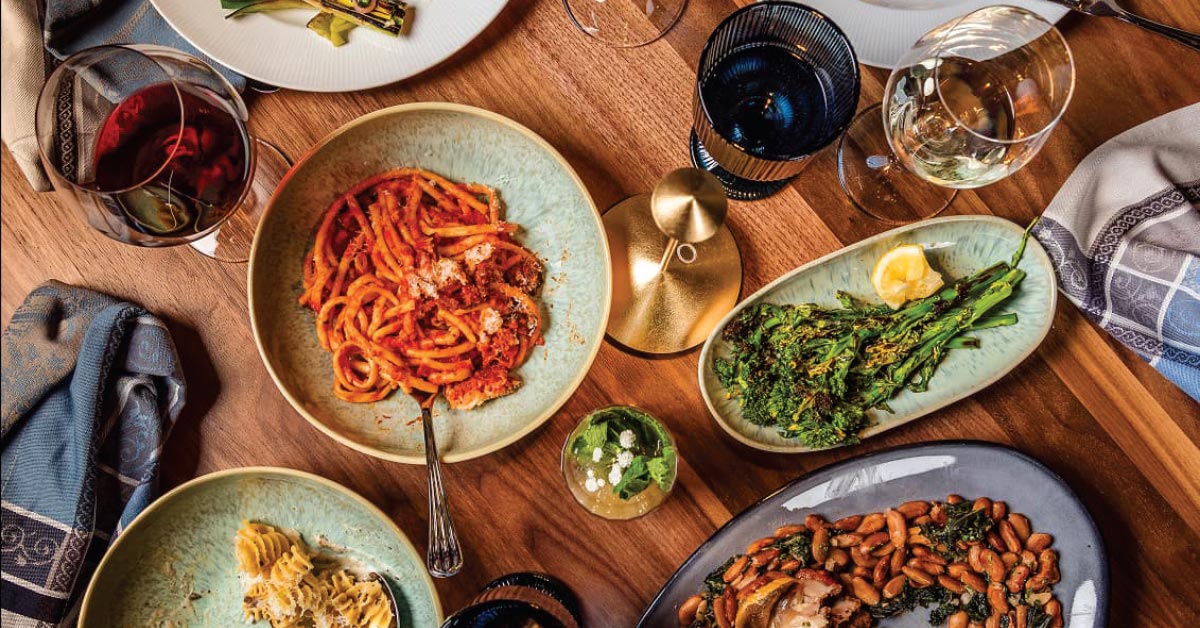Every Wednesday afternoon, local chefs and West Michigan farmers converge in a warehouse located at the corner of Hall and Godfrey Streets to buy and sell produce and other products produced by the farms.
The farmers arrive, covering long wooden tables with boxes brimming with produce picked fresh that morning, and the chefs show up eager to pick up what will become ingredients in their menu features for the weekend. The farmers and chefs stand around the tables discussing the growing season, recipes and just generally chatting and laughing with one another.
The exchange is a result of the increased media attention given to farming practices and food safety, as well as a growing desire by local restaurants to connect with small and mid-sized farms to enhance the quality of their menu by using the freshest ingredients available.
Jerry Adams had been visiting farm markets with his wife Amy, who is a chef, when he began to question how profitable the farmers market model is for the farmer. He decided to see if he could improve farmers' profitability and help them connect with consumers more easily by creating an online farmers market. He started the West Michigan Co-Op nearly six years ago and it quickly flourished into a non-profit that serves more than 300 families on a monthly basis with goods from approximately 40 producers from the nine counties surrounding Kent County.
With the success of the co-op, Adams decided it was time to do what had initially interested him - to try and connect local farms with local chefs. The result is FarmLink, started one year ago as a way for chefs and farmers to connect more easily.
"We are trying to make a very simple and convenient connection between all of the area growers and farmers that we have here and get their products into the hands of chefs at restaurants or hospitals or even schools," said Scott Hawkins, operations manager at FarmLink.
They do this through a website that allows the producers to load in all the products that they would like to sell for a particular ordering cycle.
"We do this every week, and then the chefs go on and pick and choose the things they would like to add to their order to feature on their menu," Hawkins said.
Adams said the most important part of FarmLink is that face-to-face connection. He wanted farmers and chefs to get to know one another, rather than just have middlemen dropping off and intercepting orders at the door.
FarmLink has taken off in its first year, with 25 producers and 15 restaurants currently participating, and Hawkins continues to get calls weekly from interested restaurants and farmers. In fact, the once-a-week meet-up has been such a success that the exchange is being increased to twice weekly to meet everyone's needs.
Charlie Ham, owner of Ham Family Farm, has been a farmer for the past 40 years and has worked with local restaurants in Grand Rapids and Grand Haven during that time. He is pleased to have FarmLink as a tool and said before it was always challenging to find the time to introduce himself and set up a new relationship.
Ham has seen interest in locally raised and grown food increase drastically, especially during the last decade.
"When I started out, I think the basic food consumer was quite enamored with strawberries from Peru or Chile or wherever they could buy in the winter time," he said. "There wasn't really any thought or concern about local produce ... There are probably a lot of variables that caused it, but I am sure that a concern for the pesticide load on food was a big concern and then also taste."
"Everybody watches food shows now," Ham added. "There has been a dramatic increase in the common person's knowledge about food."
Chris Perkey, executive chef at Kent Country Club, agrees that a lot has changed, including the chef and farmer relationship. Perkey has worked at several restaurants during his 30-year career, and has seen the market for locally grown products expand and with it the relationships with the farmers.
"I think what is probably the main difference is the communication between the chefs and farmers," Perkey said. "It always started out before where you would start dealing with a farmer and at the beginning of the year he would say what do you want to use and I'd say, ‘Oh, we'll use this, this and this,' and they wouldn't stagger their crops, so July 4, we'd get a huge delivery of green beans that we couldn't use."
Now Perkey says increased communication has led many farmers to stagger their crops so that the farms can supply the restaurants all summer long. He also mentions that farmers are great resources for recipes, since many of them grew up eating those foods and have found unique ways to prepare them.
But chefs aren't the only ones eager to get their hands on the freshest produce. Consumers are showing an increased interest in where restaurants are buying their products. It's become common for restaurants to highlight the farms they are working with on their menus, and local chefs said just putting a farms name on there is a great marketing tool.
The increased desire for consumers to know where their food is coming from has influenced several restaurants into trying to make local produce even more local, by growing it in their backyards.
Perkey began a garden four years ago on the grounds of Kent Country Club. He has grown brussel sprouts, tomatoes, mint, basil, oregano, Swiss chard, onions, zucchini, yellow squash and many other vegetables.
Justin Dalenberg, executive chef at JW Marriott, also keeps a garden for his restaurant. This summer, 276 individual plants will be planted in the 500 square foot garden as well as in 20 planters located on the hotel's jdek.
Dallenberg and Perkey both say gardens are great and are fun for customers, but for most restaurants the garden is more an example of local produce, not a replacement for doing business with small and mid-sized farms.
"Really, we do it because we love to have an example of what we do," Dallenberg said. "The fresher the food, the better the flavor, the better the product. We like to provide our customer with a small-scale version of what we buy from, the small local farm. It's nice to see a working garden, because we actually do use all the products that are in there. We harvest it four times in the summer. We actually cut it down and replant it four different times according to the different growing seasons."
Still, the interest in restaurants growing their own produce is starting to open the door to a new trend: farmers becoming chefs and chefs becoming farmers.
"I think in the last six months, especially in the Grand Rapids market, you've seen a lot of different things happen," said Tim Shearer, owner of Vertical Paradise Farms. "We have farms going into the restaurant business and we have restaurateurs going into the farm business."
One example is the opening of Trillium Haven's new restaurant. Trillium Haven has supplied products to several local restaurants as well as operated a successful food co-op. The farm is now trying its hand at a full-scale restaurant in Eastown.
Whether farmers and chefs are using FarmLink or connecting some other way, more and more West Michigan restaurants are working with local small and mid-sized farms. The days of wanting strawberries in winter from Chile have given way to the desire for freshness, enhanced taste and a wider variety of foods and recipes.
Restaurants buying from local small and mid-sized farms: Amore, Bar Divani, Bartertown Diner, Bistro Bella Vita, Café Fresh, Derby Station, Electric Cheetah, Elegance of the Season, Food Dance, Graydon's Crossing, Green Well, Grove, Harmony Brewing, Hop Cat, Jeanne's Café, Logan's Alley, Marie Catribs, Millennium Restaurant Group, Olives, One Trick Pony, Ramona's Table, Republic/Rockwells, Rustica, Salt of the Earth, San Chez, Silver Spork Food Truck, Stella's Lounge, Winchester
Local small and mid-sized farms selling to restaurants: Alexander Farms, Creswick Farms, Dancing Goat Creamery, Earthkeeper Farm, Evergreen Lane Farm and Creamery, Fat Blossom, Fuehring Farms, Funny Farm Organic Produce, Gavin Orchards, Grand RAWpids, Green Wagon Farm, Groundswell Farm, Heidi's Farm Stand, Lubbers Farm, Mud Lake Farm, S&S Lamb, Shadowland Seeds, Shrimp Farm Market, Vertical Paradise Farms, Visser Farms, Wells Orchards
Want to check out the garden before dinner: Amore, Blue Water Grill, the Essence Group, JW Marriott, Winchester
Where to Shop
While it is still a challenge for farmers to get their products into the grocery store aisles, here are a few stores that carry products from small and mid-sized West Michigan farms.
Forest Hills Foods
4668 Cascade Rd., Grand Rapids
Vertical Paradise Farms
Grand Central Market
57 Monroe Center, Grand Rapids
Mud Lake Farm
Harvest Health
4150 32nd Ave. Hudsonville, 1944 Eastern Ave., SE
6807 Cascade Rd.
CJ Veggies, Fat Blossom, Groundswell
Kingmas
2225 Plainfield Ave., Grand Rapids
Vertical Paradise Farms
Ninth Bridge Market
496 Ada Dr. SE, Ada
Creswick Farms
Nourish Organic Market
634 Wealthy St. S.E., Grand Rapids
Vertical Paradise Farms
Orchard Markets
17026 Lloyd's Bayou Dr., Spring Lake
6530 Airline Rd., Fruitport
Vertical Paradise Farms




